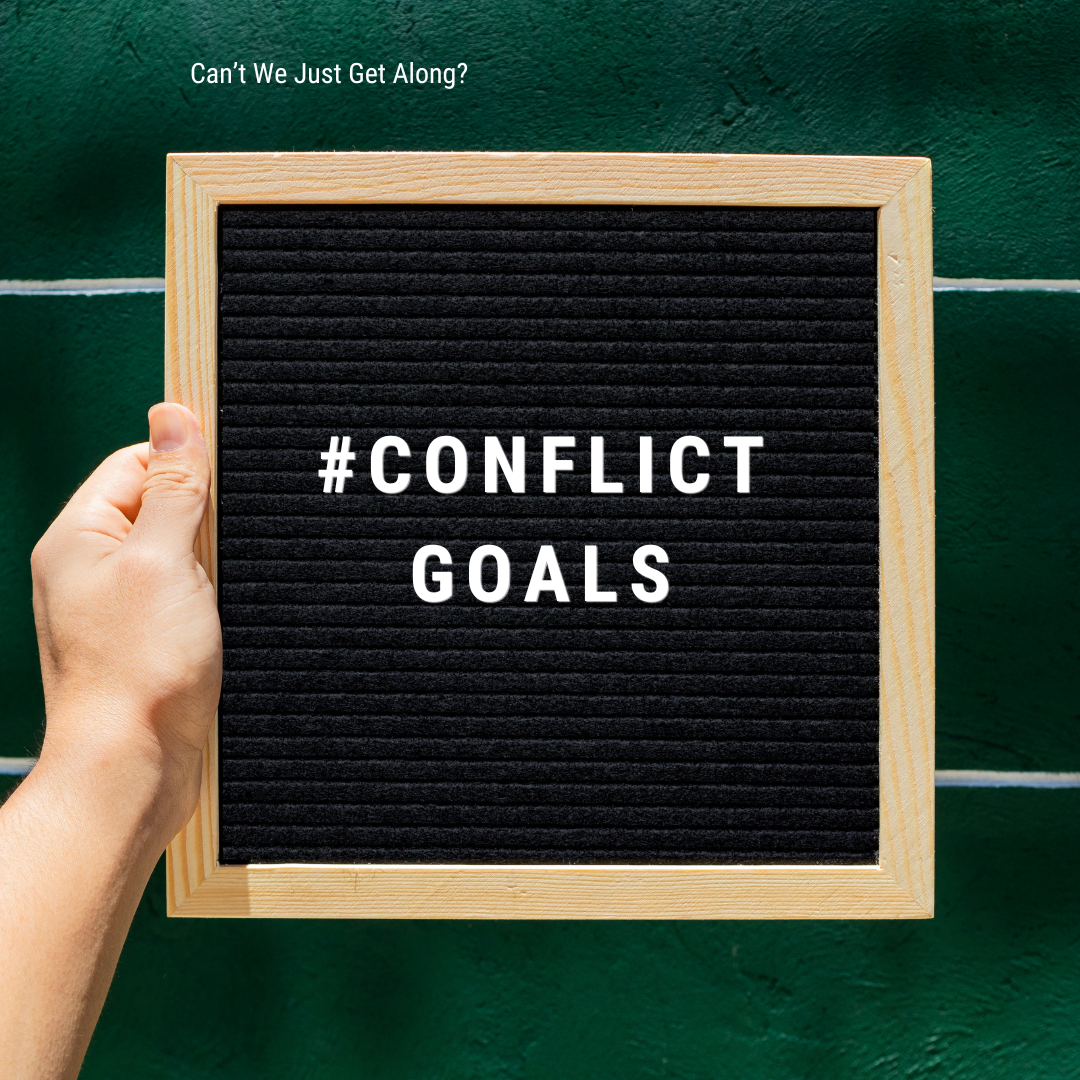Goals
Understanding Conflict Goals
 The word “conflict” includes “real or perceived incompatible goals.” McCorkle and Reese (2009) provide us with a very simple framework for analyzing the conflict in relation to goal incompatibility and interference. The types of goals they identify are:
The word “conflict” includes “real or perceived incompatible goals.” McCorkle and Reese (2009) provide us with a very simple framework for analyzing the conflict in relation to goal incompatibility and interference. The types of goals they identify are:
Substantive Goals – Our ability to secure tangible resources and/or something measurable and visible that we desire. Example – in a living situation with multiple roommates, I could have a substantive goal that our home is clean.
Process Goals – How events or processes unfold, how decisions are made, and how communication takes place. Continuing with the above example – in a living situation with multiple roommates, I could have a substantive goal that our home is clean, as well as a process goal that all the roommates clean up the kitchen as soon as they are done using it (cleaning is an event/process that is taking place).
Relationship Goals – How people relate to one another. Continuing with the above example – in a living situation with multiple roommates, I could have a substantive goal that our home is clean. A process goal that all the roommates clean up the kitchen as soon as they are done using it. As well as a relationship goal that sharing the responsibility of cleaning is what makes a good roommate relationship.
Face Goals – How one’s self-image is perceived in a social setting. Continuing with the above example – in a living situation with multiple roommates, I could have a substantive goal that our home is clean. A process goal that all the roommates clean up the kitchen as soon as they are done using it. A relationship goal that sharing the responsibility of cleaning is what makes a good roommate relationship. And a face goal that my house is clean when I invite my friends and family over so they don’t think I am a slob.
| Types of Goals | |
| Definition of Goal | |
| Substantive | Ability to secure tangible resources and/or something measurable/visible. |
| Process | Desire to have events and processes unfold in a certain way. These processes include how decision are made and how/when communication happens. |
| Relationship | How we relate to one another, in any relationship setting. |
| Face | Ability to uphold one’s self-image as it is perceived in a social setting. |
As you can see in the above example of a living situation with multiple roommates, there could be disagreements or differing views with any one of the goals listed. Having a clean house isn’t important to everyone. Having a set process for how shared kitchen cleaning happens isn’t important to everyone. Having a “clean” roommate isn’t important to everyone. Caring about what friends and family think about your house isn’t important to everyone. These are the points where conflict happens, when we have seemingly incompatible goals OR someone is interfering with one of the goals.
This framework allows us to start understanding ourselves in a conflict situation. Think about a conflict you are currently experiencing. Ask yourself, which type of goals do you have? Which goals do you perceive some type of incompatibility or interference? If you have more than one goal, which goal is most important? Once you understand what goals you really have in conflict, you can start addressing the real issue and move towards resolving the conflict you are experiencing.
Once you start thinking about conflicts you have experienced in your lifetime, you may notice that you have a pattern with conflict situations. Is there a type of goal interference that leads to most of your conflicts? It is important to note here that Substantive Goals often times mask other goals when we bring up a conflict with others. It is much easier to talk about “dirty dishes” (something tangible and visible) than it is to admit that you care about what your friends and family think about your home (face goal – self-image in relation to others). One way to recognize this is happening is when someone does what you ask them to (like clean the dishes) but you still find yourself upset. In that type of situation, it is likely something else going on.
When you think about the conflicts that you have experienced in your life, consider if you have masked the “real” conflict with something that is seemingly easier and less vulnerable to talk about.

